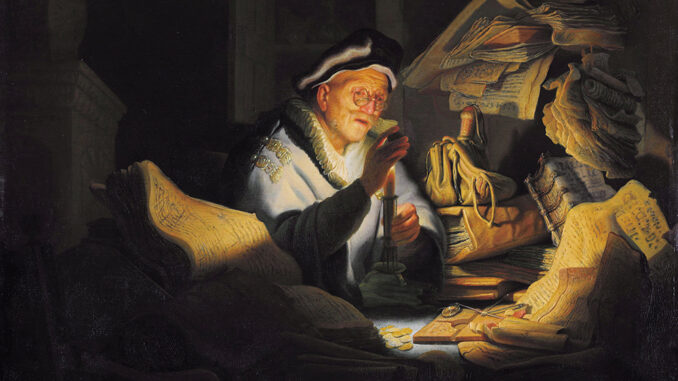
A striking feature in the parables of Jesus Christ is their adaptation to the immediate circumstances in connection with which they were delivered. They are not fetched from afar — detached and isolated allegories. They are not strained and forced but fall in most naturally with the subject of His discourse. They are mortised and tenoned so aptly to the occasion, that we can scarcely see the joint by which they are framed together.
The parable of the Rich Fool furnishes an instance of this felicitous illustration.
“And one of the company said unto him, Master, speak to my brother, that he divide the inheritance with me. And he said unto him, Man, who made me a judge or a divider over you? And he said unto them, Take heed, and beware of covetousness: for a man’s life consisteth not in the abundance of the things which he possesseth.
“And he spake a parable unto them, saying, The ground of a certain rich man brought forth plentifully: And he thought within himself, saying, What shall I do, because I have no room where to bestow my fruits? And he said, This will I do: I will pull down my barns, and build greater; and there will I bestow all my fruits and my goods. And I will say to my soul, Soul, thou hast much goods laid up for many years; take thine ease, eat, drink, and be merry. But God said unto him, Thou fool, this night thy soul shall be required of thee: then whose shall those things be, which thou hast provided? So is he that layeth up treasure for himself, and is not rich toward God.” Luke 12:13-21
In the midst of a discourse to his disciples, one of his company asked Jesus to intervene over the division the man’s inheritance. But Jesus, aware of the jealousy of the Jews, should he exercise any judicial functions, said unto him, “Man, who appointed me a judge or an arbiter between you?”
Whether this was a real cause or a question meant to entrap Jesus in his words we know not. He was not entrapped and warns him whose heart is so set upon a worldly inheritance to guard against greed because a man’s life does not consist in the abundance of his possessions.
Having delivered this parable and sealed it upon the mind by an aphoristic moral, Jesus resumes his discourse to his disciples, and leaves the offended brother to ponder the solemn truths which he had heard.
The first thing presented to us in this parable is the fact, that the riches of this man were honestly acquired. It was the legitimate produce of his fields. His wealth was not wrung from poverty, extorted by oppression, or amassed by fraudulent trade but the product of honest industry.
It was important to the success of this parable, that the riches of the man were the honest sort, for, had they been ill-gotten gains, the rebuke, in the minds of many, would have rested upon the manner in which he acquired riches, rather than in the trusting to riches itself, however honestly obtained.
With the increase of his wealth, the man was intent only upon hoarding up what he had gained. Having revolved the matter on wholly selfish principles, never once thinking that he was God’s steward to disburse those riches, rather than his banker to hoard them — he comes to a resolve “I will pull down my barns, and build greater.”
It never seems to have occurred to him, that God, and not himself, was the disposer of his wealth, his happiness, his life. Absorbed in the moment — his crops, his fields, his barns — he forgot his soul.
But in this state of peace, plenty, and pleasure — his thoughts stretching out into the future, and his plans maturing to perfection, he is suddenly aroused by the voice of God, who reminded him of the frailty of life and the eternal timeline of the soul. God reminded him how quickly dreams of pleasure and schemes of greatness vanish at the solemn voice of God. Instead of having “much goods laid up for many years,” he had nothing laid up for eternity.
Having thus interested them in the parable, Jesus draws out the moral in a short but comprehensive sentence. “So is he that layeth up treasure for himself, and is not rich toward God.”
The riches of faith, hope, love, joy and peace are “durable riches,” which will ever increase in value, and ever impart bliss, when the world, with its treasures of gold and silver and precious stones, are gone.
William Bacon Stevens (1815-1887) was a medical doctor, the state historian of Georgia and priest in the Episcopal Church. He served as the Bishop of Pennsylvania from 1865 to 1887.



